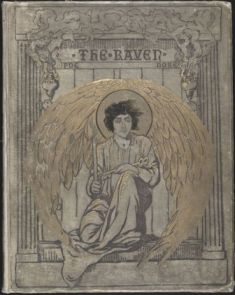
|
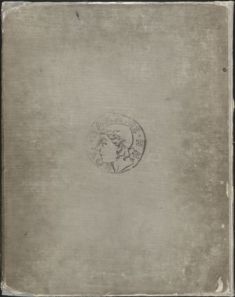
|
The Project Gutenberg EBook of The Raven, by Edgar Allan Poe This eBook is for the use of anyone anywhere at no cost and with almost no restrictions whatsoever. You may copy it, give it away or re-use it under the terms of the Project Gutenberg License included with this eBook or online at www.gutenberg.org Title: The Raven Author: Edgar Allan Poe Commentator: Edmund C. Stedman Illustrator: Gustave Doré Release Date: November 30, 2005 [EBook #17192] [Last updated: October 6, 2012] Language: English Character set encoding: ISO-8859-1 *** START OF THIS PROJECT GUTENBERG EBOOK THE RAVEN *** Produced by Jason Isbell, Melissa Er-Raqabi and the Online Distributed Proofreading Team at https://www.pgdp.net.
ByEDGAR ALLAN POE |
ILLUSTRATEDBy GUSTAVE DORÉ |
WITH COMMENT BY EDMUND C. STEDMAN
NEW YORK
HARPER & BROTHERS, PUBLISHERS, FRANKLIN SQUARE
1884
Entered according to Act of Congress, in the year 1883, by
HARPER & BROTHERS,
In the Office of the Librarian of Congress, at Washington.
All rights reserved.
In the List of Illustrations I restored a missing single quote after Lenore! as shown below:
"'Wretch,' I cried, 'thy God hath lent thee—by these angels he hath sent thee
Respite—respite and nepenthe from thy memories of Lenore!'"
The List of Illustrations uses 'visitor' where the poem and the actual illustration use 'visiter'.
The secret of a poem, no less than a jest's prosperity, lies in the ear of him that hears it. Yield to its spell, accept the poet's mood: this, after all, is what the sages answer when you ask them of its value. Even though the poet himself, in his other mood, tell you that his art is but sleight of hand, his food enchanter's food, and offer to show you the trick of it,—believe him not. Wait for his prophetic hour; then give yourself to his passion, his joy or pain. "We are in Love's hand to-day!" sings Gautier, in Swinburne's buoyant paraphrase,—and from morn to sunset we are wafted on the violent sea: there is but one love, one May, one flowery strand. Love is eternal, all else unreal and put aside. The vision has an end, the scene changes; but we have gained something, the memory of a charm. As many poets, so many charms. There is the charm of Evanescence, that which lends to supreme beauty and grace an aureole of Pathos. Share with Landor his one "night of memories and of sighs" for Rose Aylmer, and you have this to the full.
And now take the hand of a new-world minstrel, strayed from some proper habitat to that rude and dissonant America which, as Baudelaire saw, "was for Poe only a vast prison through which he ran, hither and thither, with the feverish agitation of a being created to breathe in a purer world," and where "his interior life, spiritual as a poet, spiritual even as a drunkard, was but one perpetual effort to escape the influence of this antipathetical atmosphere." Clasp the sensitive hand of a troubled singer dreeing thus his weird, and share with him the clime in which he found,—never throughout the day, always in the night,—if not the Atlantis whence he had wandered, at least a place of refuge from the bounds in which by day he was immured.
To one land only he has power to lead you, and for one night only can you share his dream. A tract of neither Earth nor Heaven: "No-man's-land," out of Space, out of Time. Here are the perturbed ones, through whose eyes, like those of the Cenci, the soul finds windows though the mind is dazed; here spirits, groping for the path which leads to Eternity, are halted and delayed. It is the limbo of "planetary souls," wherein are all moonlight uncertainties, all lost loves and illusions. Here some are fixed in trance, the only respite attainable; others
while everywhere are
Such is the land, and for one night we enter it,—a night of astral phases and recurrent chimes. Its monodies are twelve poems, whose music strives to change yet ever is the same. One by one they sound, like the chiming of the brazen and ebony clock, in "The Masque of the Red Death," which made the waltzers pause with "disconcert and tremulousness and meditation," as often as the hour came round.
Of all these mystical cadences, the plaint of The Raven, vibrating through the portal, chiefly has impressed the outer world. What things go to the making of a poem,—and how true in this, as in most else, that race which named its bards "the makers"? A work is called out of the void. Where there was nothing, it remains,—a new creation, part of the treasure of mankind. And a few exceptional lyrics, more than others that are equally creative, compel us to think anew how bravely the poet's pen turns things unknown
Each seems without a prototype, yet all fascinate us with elements wrested from the shadow of the Supernatural. Now the highest imagination is concerned about the soul of things; it may or may not inspire the Fantasy that peoples with images the interlunar vague. Still, one of these lyrics, in its smaller way, affects us with a sense of uniqueness, as surely as the sublimer works of a supernatural cast,—Marlowe's "Faustus," the "Faust" of Goethe, "Manfred," or even those ethereal masterpieces, "The Tempest" and "A Midsummer Night's Dream." More than one, while otherwise unique, has some[10] burden or refrain which haunts the memory,—once heard, never forgotten, like the tone of a rarely used but distinctive organ-stop. Notable among them is Bürger's "Lenore," that ghostly and resonant ballad, the lure and foil of the translators. Few will deny that Coleridge's wondrous "Rime of the Ancient Mariner" stands at their very head. "Le Juif-Errant" would have claims, had Beranger been a greater poet; and, but for their remoteness from popular sympathy, "The Lady of Shalott" and "The Blessed Damozel" might be added to the list. It was given to Edgar Allan Poe to produce two lyrics, "The Bells" and The Raven, each of which, although perhaps of less beauty than those of Tennyson and Rossetti, is a unique. "Ulalume," while equally strange and imaginative, has not the universal quality that is a portion of our test.
The Raven in sheer poetical constituents falls below such pieces as "The Haunted Palace," "The City in the Sea," "The Sleeper," and "Israfel." The whole of it would be exchanged, I suspect, by readers of a fastidious cast, for such passages as these:
It lacks the aerial melody of the poet whose heart-strings are a lute:
But The Raven, like "The Bells" and "Annabel Lee," commends itself to the many and the few. I have said elsewhere that Poe's rarer productions seemed to me "those in which there is the appearance, at least, of spontaneity,—in which he yields to his feelings, while dying falls and cadences most musical, most melancholy, come from him unawares." This is still my belief; and yet, upon a fresh study of this poem, it impresses me more than at any time since my boyhood. Close acquaintance tells in favor of every true work of art. Induce the man, who neither knows art nor cares for it, to examine some poem or painting, and how soon its force takes hold of him! In fact, he will overrate the relative value of the first good work by which his attention has been fairly caught. The Raven, also, has consistent qualities which even an expert must admire. In no other of its author's poems is the motive more palpably defined. "The Haunted Palace" is just as definite to the select reader, but Poe scarcely would have taken that subtle allegory for bald analysis. The Raven is wholly occupied with the author's typical theme—the irretrievable loss of an idolized and beautiful woman; but on other grounds, also, the public instinct is correct in thinking it his representative poem.
A man of genius usually gains a footing with the success of some one effort, and this is not always his greatest. Recognition is the more instant for having been postponed. He does not acquire it, like a miser's fortune, coin after coin, but "not at all or all in all." And thus with other ambitions: the courtier, soldier, actor,—whatever their parts,—each counts his triumph from some lucky stroke. Poe's Raven, despite augury, was for him "the bird that made the breeze to blow." The poet settled in New-York, in the winter of 1844-'45, finding work upon Willis's paper, "The Evening Mirror," and eking out his income by contributions elsewhere. For six years he had been an active writer, and enjoyed a professional reputation; was held in both respect and misdoubt, and was at no loss for his share of the ill-paid journalism of that day. He also had done much of his very best work,—such tales as "Ligeia" and "The Fall of the House of Usher," (the latter containing that mystical counterpart, in verse, of Elihu Vedder's "A Lost Mind,") such analytic feats as "The Gold Bug" and "The Mystery of Marie Roget." He had made proselytes abroad, and gained a lasting hold upon the French mind. He had learned his own power and weakness, and was at his prime, and not without a certain reputation. But he had written nothing that was on the tongue of everybody. To rare and delicate work some popular touch must be added to capture the general audience of one's own time.
Through the industry of Poe's successive biographers, the hit made by The Raven has become an oft-told tale. The poet's young wife, Virginia, was fading before his eyes, but lingered for another year within death's shadow. The long, low chamber in the house near the Bloomingdale Road is as[11] famous as the room where Rouget de l'Isle composed the Marseillaise. All have heard that the poem, signed "Quarles," appeared in the "American Review," with a pseudo-editorial comment on its form; that Poe received ten dollars for it; that Willis, the kindest and least envious of fashionable arbiters, reprinted it with a eulogy that instantly made it town-talk. All doubt of its authorship was dispelled when Poe recited it himself at a literary gathering, and for a time he was the most marked of American authors. The hit stimulated and encouraged him. Like another and prouder satirist, he too found "something of summer" even "in the hum of insects." Sorrowfully enough, but three years elapsed,—a period of influence, pride, anguish, yet always of imaginative or critical labor,—before the final defeat, before the curtain dropped on a life that for him was in truth a tragedy, and he yielded to "the Conqueror Worm."
"The American Review: A Whig Journal" was a creditable magazine for the time, double-columned, printed on good paper with clear type, and illustrated by mezzotint portraits. Amid much matter below the present standard, it contained some that any editor would be glad to receive. The initial volume, for 1845, has articles by Horace Greeley, Donald Mitchell, Walter Whitman, Marsh, Tuckerman, and Whipple. Ralph Hoyt's quaint poem, "Old," appeared in this volume. And here are three lyrics by Poe: "The City in the Sea," "The Valley of Unrest," and The Raven. Two of these were built up,—such was his way,—from earlier studies, but the last-named came out as if freshly composed, and almost as we have it now. The statement that it was not afterward revised is erroneous. Eleven trifling changes from the magazine-text appear in The Raven and Other Poems, 1845, a book which the poet shortly felt encouraged to offer the public. These are mostly changes of punctuation, or of single words, the latter kind made to heighten the effect of alliteration. In Mr. Lang's pretty edition of Poe's verse, brought out in the "Parchment Library," he has shown the instinct of a scholar, and has done wisely, in going back to the text in the volume just mentioned, as given in the London issue of 1846. The "standard" Griswold collection of the poet's works abounds with errors. These have been repeated by later editors, who also have made errors of their own. But the text of The Raven, owing to the requests made to the author for manuscript copies, was still farther revised by him; in fact, he printed it in Richmond, just before his death, with the poetic substitution of "seraphim whose foot-falls" for "angels whose faint foot-falls," in the fourteenth stanza. Our present text, therefore, while substantially that of 1845, is somewhat modified by the poet's later reading, and is, I think, the most correct and effective version of this single poem. The most radical change from the earliest version appeared, however, in the volume in 1845; the eleventh stanza originally having contained these lines, faulty in rhyme and otherwise a blemish on the poem:
It would be well if other, and famous, poets could be as sure of making their changes always improvements. Poe constantly rehandled his scanty show of verse, and usually bettered it. The Raven was the first of the few poems which he nearly brought to completion before printing. It may be that those who care for poetry lost little by his death. Fluent in prose, he never wrote verse for the sake of making a poem. When a refrain of image haunted him, the lyric that resulted was the inspiration, as he himself said, of a passion, not of a purpose. This was at intervals so rare as almost to justify the Fairfield theory that each was the product of a nervous crisis.
What, then, gave the poet his clue to The Raven? From what misty foundation did it rise slowly to a music slowly breathed? As usual, more than one thing went to the building of so notable a poem. Considering the longer sermons often preached on brief and less suggestive texts, I hope not to be blamed for this discussion of a single lyric,—especially one which an artist like Doré has made the subject of prodigal illustration. Until recently I had supposed that this piece, and a few which its author composed after its appearance, were exceptional in not having grown from germs in his boyish verse. But Mr. Fearing Gill has shown me some unpublished stanzas by Poe, written in his eighteenth year, and entitled, "The Demon of the Fire." The manuscript appears to be in the poet's early handwriting, and its genuineness is vouched for by the family in whose possession it has remained for half a century. Besides the plainest germs of "The Bells" and "The Haunted Palace" it contains a few lines somewhat suggestive of the opening and close of The Raven. As to the rhythm of our poem, a comparison of dates indicates that this was influenced by the rhythm of "Lady Geraldine's Courtship." Poe was one of the first to honor Miss Barrett's genius; he inscribed his collected poems to her as "the noblest of her sex," and was in[12] sympathy with her lyrical method. The lines from her love-poem,
found an echo in these:
Here Poe assumed a privilege for which he roughly censured Longfellow, and which no one ever sought on his own premises without swift detection and chastisement. In melody and stanzaic form, we shall see that the two poems are not unlike, but in motive they are totally distinct. The generous poetess felt nothing but the true originality of the poet. "This vivid writing!" she exclaimed,—"this power which is felt!... Our great poet, Mr. Browning, author of 'Paracelsus,' &c., is enthusiastic in his admiration of the rhythm." Mr. Ingram, after referring to "Lady Geraldine," cleverly points out another source from which Poe may have caught an impulse. In 1843, Albert Pike, the half-Greek, half-frontiersman, poet of Arkansas, had printed in "The New Mirror," for which Poe then was writing, some verses entitled "Isadore," but since revised by the author and called "The Widowed Heart." I select from Mr. Pike's revision the following stanza, of which the main features correspond with the original version:
Here we have a prolonged measure, a similarity of refrain, and the introduction of a bird whose song enhances sorrow. There are other trails which may be followed by the curious; notably, a passage which Mr. Ingram selects from Poe's final review of "Barnaby Rudge":
"The raven, too, * * * might have been made, more than we now see it, a portion of the conception of the fantastic Barnaby. * * * Its character might have performed, in regard to that of the idiot, much the same part as does, in music, the accompaniment in respect to the air."
Nevertheless, after pointing out these germs and resemblances, the value of this poem still is found in its originality. The progressive music, the scenic detail and contrasted light and shade,—above all, the spiritual passion of the nocturn, make it the work of an informing genius. As for the gruesome bird, he is unlike all the other ravens of his clan, from the "twa corbies" and "three ravens" of the balladists to Barnaby's rumpled "Grip." Here is no semblance of the cawing rook that haunts ancestral turrets and treads the field of heraldry; no boding phantom of which Tickell sang that, when,
Poe's raven is a distinct conception; the incarnation of a mourner's agony and hopelessness; a sable embodied Memory, the abiding chronicler of doom, a type of the Irreparable. Escaped across the Styx, from "the Night's Plutonian shore," he seems the imaged soul of the questioner himself,—of him who can not, will not, quaff the kind nepenthe, because the memory of Lenore is all that is left him, and with the surcease of his sorrow even that would be put aside.
The Raven also may be taken as a representative poem of its author, for its exemplification of all his notions of what a poem should be. These are found in his essays on "The Poetic Principle," "The Rationale of Verse," and "The Philosophy of Composition." Poe declared that "in Music, perhaps, the soul most nearly attains the great end for which, when inspired by the Poetic Sentiment, it struggles—the creation of supernal Beauty.... Verse cannot be better designated than as an inferior or less capable music"; but again, verse which is really the "Poetry of Words" is "The Rhythmical Creation of Beauty,"—this and nothing more. The tone of the highest Beauty is one of Sadness. The most melancholy of topics is Death. This must be allied to Beauty. "The death, then, of a beautiful woman is, unquestionably, the most poetical topic in the world,—and equally is it beyond doubt that the lips best suited for such a topic are those of a bereaved lover." These last expressions are quoted from Poe's whimsical analysis of this very poem, but they indicate precisely the general range of his verse. The climax of "The Bells" is the muffled monotone of ghouls, who glory in weighing down the human heart. "Lenore," The Raven, "The Sleeper," "To One in Paradise," and "Ulalume" form a tenebrose symphony,—and "Annabel Lee," written last of all, shows that one theme possessed him to the end. Again, these are all nothing if not musical, and some are touched with that quality of the Fantastic which awakes the sense of awe, and adds a new fear to agony itself. Through all is dimly outlined, beneath a shadowy pall, the poet's ideal love,—so often half-portrayed elsewhere,—the entombed wife of Usher, the Lady Ligeia, in[13] truth the counterpart of his own nature. I suppose that an artist's love for one "in the form" never can wholly rival his devotion to some ideal. The woman near him must exercise her spells, be all by turns and nothing long, charm him with infinite variety, or be content to forego a share of his allegiance. He must be lured by the Unattainable, and this is ever just beyond him in his passion for creative art.
Poe, like Hawthorne, came in with the decline of the Romantic school, and none delighted more than he to laugh at its calamity. Yet his heart was with the romancers and their Oriental or Gothic effects. His invention, so rich in the prose tales, seemed to desert him when he wrote verse; and his judgment told him that long romantic poems depend more upon incident than inspiration,—and that, to utter the poetry of romance, lyrics would suffice. Hence his theory, clearly fitted to his own limitations, that "a 'long poem' is a flat contradiction in terms." The components of The Raven are few and simple: a man, a bird, and the phantasmal memory at a woman. But the piece affords a fine display of romantic material. What have we? The midnight; the shadowy chamber with its tomes of forgotten lore; the student,—a modern Hieronymus; the raven's tap on the casement; the wintry night and dying fire; the silken wind-swept hangings; the dreams and vague mistrust of the echoing darkness; the black, uncanny bird upon the pallid bust; the accessories of violet velvet and the gloating lamp. All this stage effect of situation, light, color, sound, is purely romantic, and even melodramatic, but of a poetic quality that melodrama rarely exhibits, and thoroughly reflective of the poet's "eternal passion, eternal pain."
The rhythmical structure of The Raven was sure to make an impression. Rhyme, alliteration, the burden, the stanzaic form, were devised with singular adroitness. Doubtless the poet was struck with the aptness of Miss Barrett's musical trochaics, in "eights," and especially by the arrangement adopted near the close of "Lady Geraldine":
His artistic introduction of a third rhyme in both the second and fourth lines, and the addition of a fifth line and a final refrain, made the stanza of The Raven. The persistent alliteration seems to come without effort, and often the rhymes within lines are seductive; while the refrain or burden dominates the whole work. Here also he had profited by Miss Barrett's study of ballads and romaunts in her own and other tongues. A "refrain" is the lure wherewith a poet or a musician holds the wandering ear,—the recurrent longing of Nature for the initial strain. I have always admired the beautiful refrains of the English songstress,—"The Nightingales, the Nightingales," "Margret, Margret," "My Heart and I," "Toll slowly," "The River floweth on," "Pan, Pan is dead," etc. She also employed what I term the Repetend, in the use of which Poe has excelled all poets since Coleridge thus revived it:
Poe created the fifth line of his stanza for the magic of the repetend. He relied upon it to the uttermost in a few later poems,—"Lenore," "Annabel Lee," "Ulalume," and "For Annie." It gained a wild and melancholy music, I have thought, from the "sweet influences," of the Afric burdens and repetends that were sung to him in childhood, attuning with their native melody the voice of our Southern poet.
"The Philosophy of Composition," his analysis of The Raven, is a technical dissection of its method and structure. Neither his avowal of cold-blooded artifice, nor his subsequent avowal to friends that an exposure of this artifice was only another of his intellectual hoaxes, need be wholly credited. If he had designed the complete work in advance, he scarcely would have made so harsh a prelude of rattle-pan rhymes to the delicious melody of the second stanza,—not even upon his theory of the fantastic. Of course an artist, having perfected a work, sees, like the first Artist, that it is good, and sees why it is good. A subsequent analysis, coupled with a disavowal of any sacred fire, readily enough may be made. My belief is that the first conception and rough draft of this poem came as inspiration always comes; that its author then saw how it might be perfected, giving it the final touches described in his chapter on Composition, and that the latter, therefore, is neither wholly false nor wholly true. The harm of such analysis is that it tempts a novice to fancy that artificial processes can supersede imagination. The impulse of genius is to guard the secrets of its creative hour. Glimpses obtained of the toil, the baffled experiments, which precede a triumph, as in the sketch-work of Hawthorne recently brought to light, afford priceless instruction and encouragement to the sincere artist. But one[14] who voluntarily exposes his Muse to the gaze of all comers should recall the fate of King Candaules.
The world still thinks of Poe as a "luckless man of genius." I recently heard him mentioned as "one whom everybody seems chartered to misrepresent, decry or slander." But it seems to me that his ill-luck ended with his pitiable death, and that since then his defence has been persistent, and his fame of as steadfast growth as a suffering and gifted author could pray for in his hopeful hour. Griswold's decrial and slander turned the current in his favor. Critics and biographers have come forward with successive refutations, with tributes to his character, with new editions of his works. His own letters and the minute incidents of his career are before us; the record, good and bad, is widely known. No appellor has received more tender and forgiving judgement. His mishaps in life belonged to his region and period, perchance still more to his own infirmity of will. Doubtless his environment was not one to guard a fine-grained, ill-balanced nature from perils without and within. His strongest will, to be lord of himself, gained for him "that heritage of woe." He confessed himself the bird's unhappy master, the stricken sufferer of this poem. But his was a full share of that dramatic temper which exults in the presage of its own doom. There is a delight in playing one's high part: we are all gladiators, crying Ave Imperator! To quote Burke's matter of fact: "In grief the pleasure is still uppermost, and the affliction we suffer has no resemblance to absolute pain, which is always odious, and which we endeavor to shake off as soon as possible." Poe went farther, and was an artist even in the tragedy of his career. If, according to his own belief, sadness and the vanishing of beauty are the highest poetic themes, and poetic feeling the keenest earthly pleasure, then the sorrow and darkness of his broken life were not without their frequent compensation.
In the following pages, we have a fresh example of an artist's genius characterizing his interpretation of a famous poem. Gustave Doré, the last work of whose pencil is before us, was not the painter, or even the draughtsman, for realists demanding truth of tone, figure, and perfection. Such matters concerned him less than to make shape and distance, light and shade, assist his purpose,—which was to excite the soul, the imagination, of the looker on. This he did by arousing our sense of awe, through marvellous and often sublime conceptions of things unutterable and full of gloom or glory. It is well said that if his works were not great paintings, as pictures they are great indeed. As a "literary artist," and such he was, his force was in direct ratio with the dramatic invention of his author, with the brave audacities of the spirit that kindled his own. Hence his success with Rabelais, with "Le Juif-Errant," "Les Contes Drolatiques," and "Don Quixote," and hence, conversely, his failure to express the beauty of Tennyson's Idyls, of "Il Paradiso," of the Hebrew pastorals, and other texts requiring exaltation, or sweetness and repose. He was a born master of the grotesque, and by a special insight could portray the spectres of a haunted brain. We see objects as his personages saw them, and with the very eyes of the Wandering Jew, the bewildered Don, or the goldsmith's daughter whose fancy so magnifies the King in the shop on the Pont-au-Change. It was in the nature of things that he should be attracted to each masterpiece of verse or prose that I have termed unique. The lower kingdoms were called into his service; his rocks, trees and mountains, the sky itself, are animate with motive and diablerie. Had he lived to illustrate Shakespeare, we should have seen a remarkable treatment of Caliban, the Witches, the storm in "Lear"; but doubtless should have questioned his ideals of Imogen or Miranda. Beauty pure and simple, and the perfect excellence thereof, he rarely seemed to comprehend.
Yet there is beauty in his designs for the "Ancient Mariner," unreal as they are, and a consecutiveness rare in a series by Doré. The Rime afforded him a prolonged story, with many shiftings of the scene. In The Raven sound and color preserve their monotone and we have no change of place or occasion. What is the result? Doré proffers a series of variations upon the theme as he conceived it, "the enigma of death and the hallucination of an inconsolable soul." In some of these drawings his faults are evident; others reveal his powerful originality, and the best qualities in which, as a draughtsman, he stood alone. Plainly there was something in common between the working moods of Poe and Doré. This would appear more clearly had the latter tried his hand upon the "Tales of the Grotesque and Arabesque." Both resorted often to the elf-land of fantasy and romance. In melodramatic feats they both, through their command of the supernatural, avoided the danger-line between the ideal and the absurd. Poe was the truer worshipper of the Beautiful; his love for it was a consecrating passion, and herein he parts company with his illustrator. Poet or artist, Death at last transfigures all: within the shadow of his sable harbinger, Vedder's symbolic crayon aptly sets them face to face, but enfolds them with the mantle of immortal wisdom and power. An American woman has wrought the image of a star-eyed Genius with the final torch, the exquisite semblance of one whose vision beholds, but whose lips may not utter, the mysteries of a land beyond "the door of a legended tomb."
Edmund C. Stedman.



|
"Once upon a midnight dreary, while I pondered, weak and weary, Over many a quaint and curious volume of forgotten lore." |

|
"Ah, distinctly I remember it was in the bleak December, And each separate dying ember wrought its ghost upon the floor." |

|
"Eagerly I wished the morrow;—vainly I had sought to borrow From my books surcease of sorrow—sorrow for the lost Lenore." |
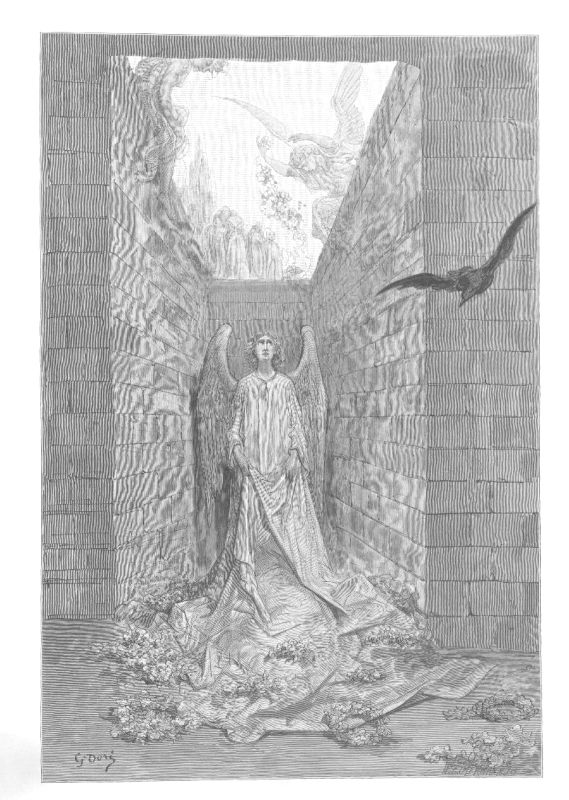
| "Sorrow for the lost Lenore." |
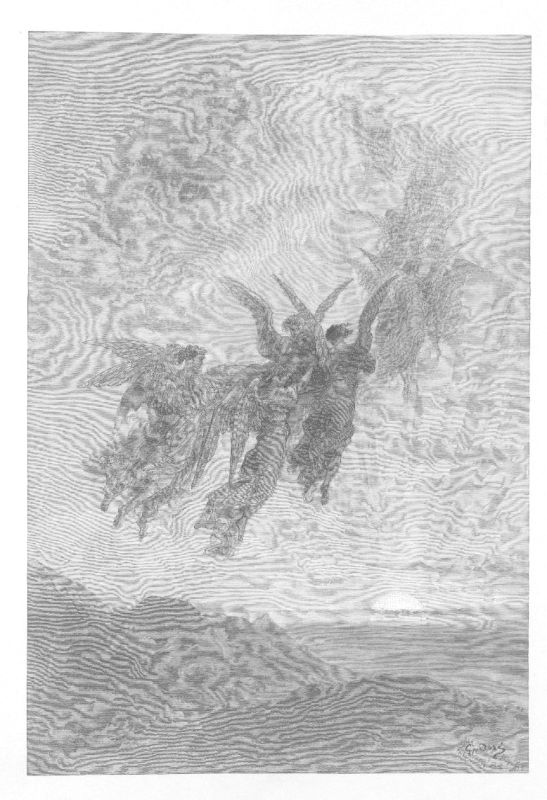
|
"For the rare and radiant maiden whom the angels name Lenore— Nameless here for evermore." |
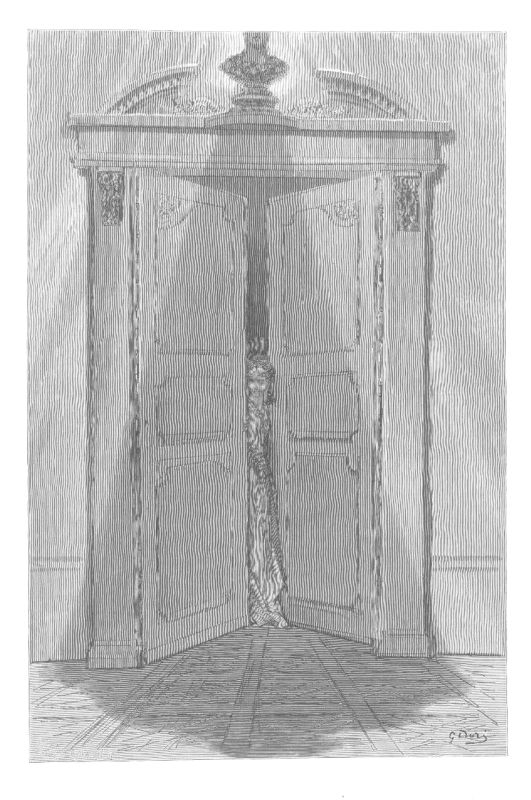
|
"'T is some visiter entreating entrance at my chamber door— Some late visiter entreating entrance at my chamber door." |
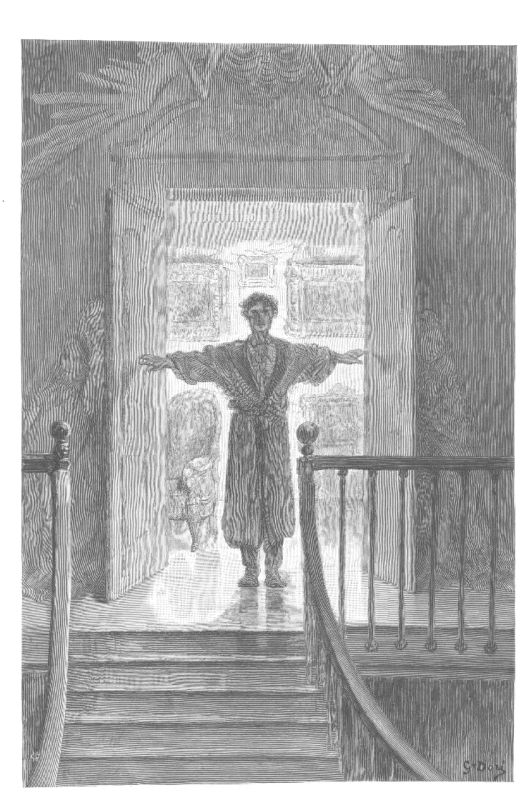
|
"Here I opened wide the door;— Darkness there, and nothing more." |
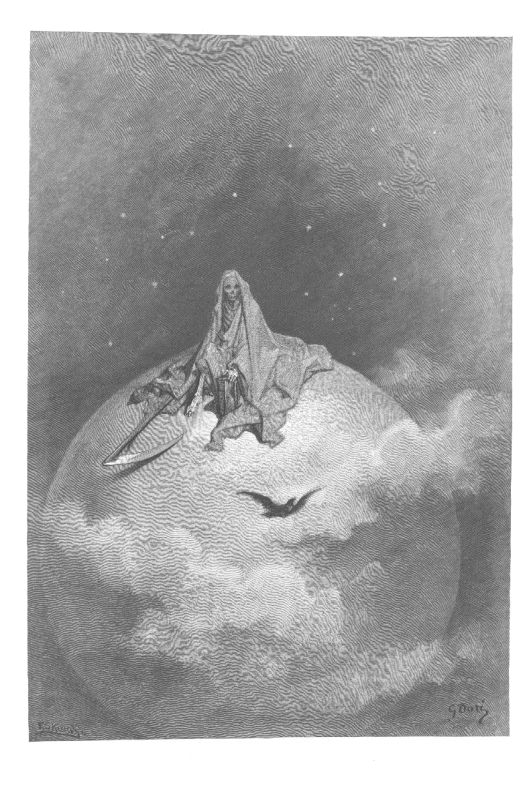
| "Doubting, dreaming dreams no mortal ever dared to dream before." |
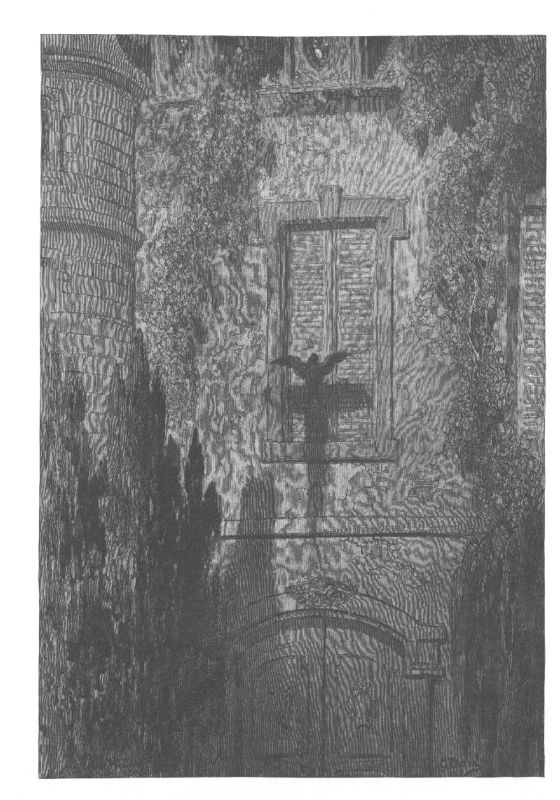
|
"'Surely,' said I, 'surely that is something at my window lattice; Let me see, then, what thereat is, and this mystery explore.'" |
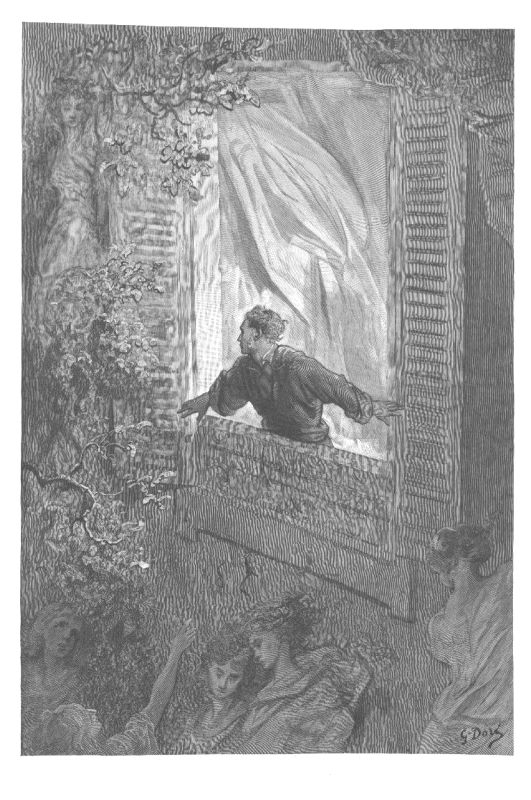
| "Open here I flung the shutter." |
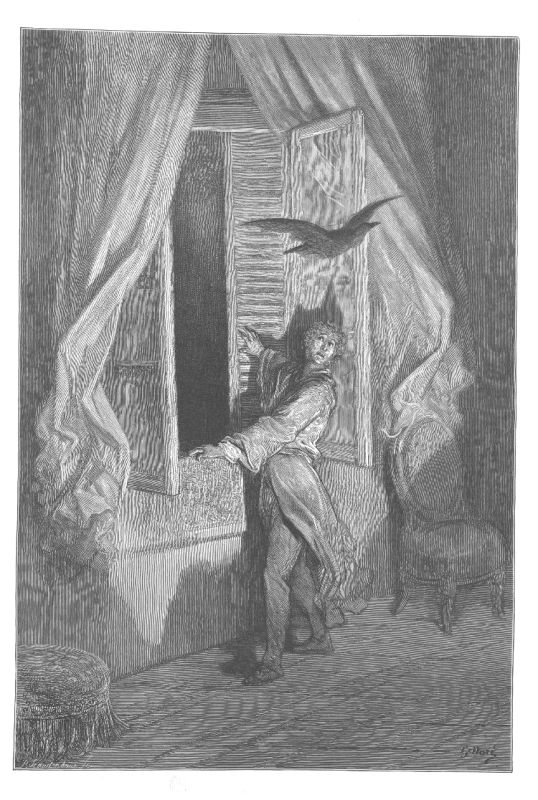
|
. . . . . . . . "A stately Raven of the saintly days of yore. Not the least obeisance made he; not a minute stopped or stayed he." |
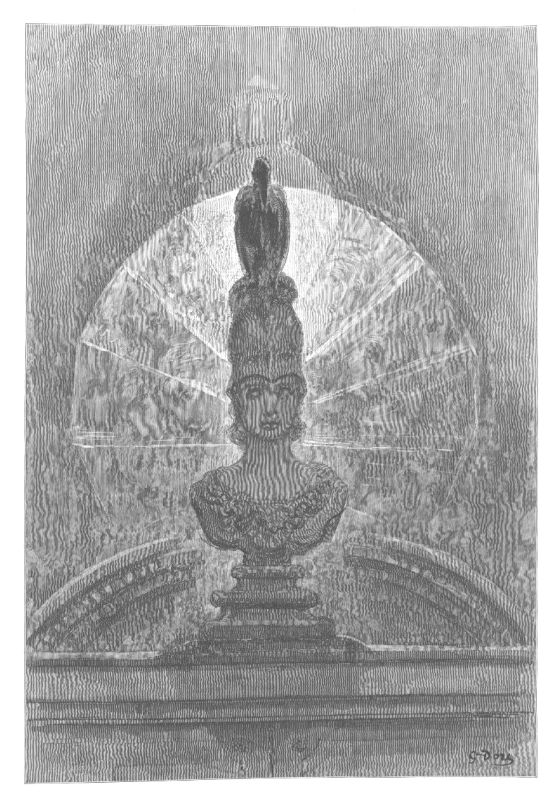
|
"Perched upon a bust of Pallas just above my chamber door— Perched, and sat, and nothing more." |
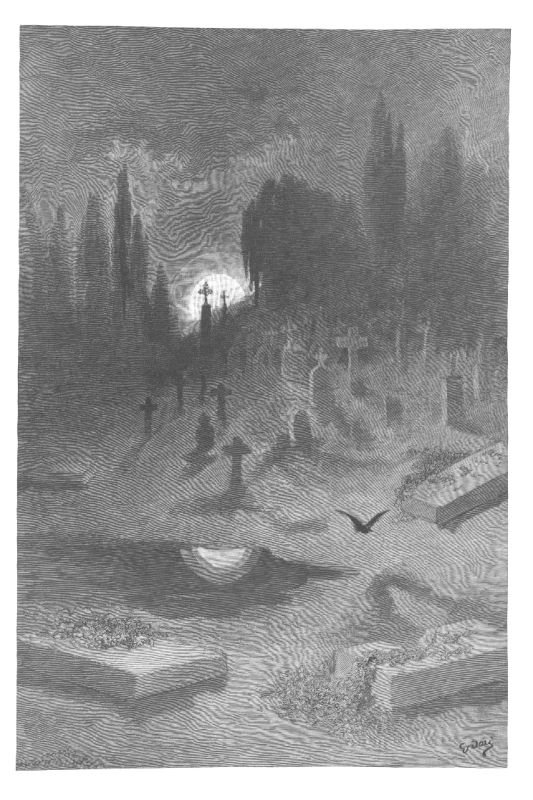
| "Wandering from the Nightly shore." |
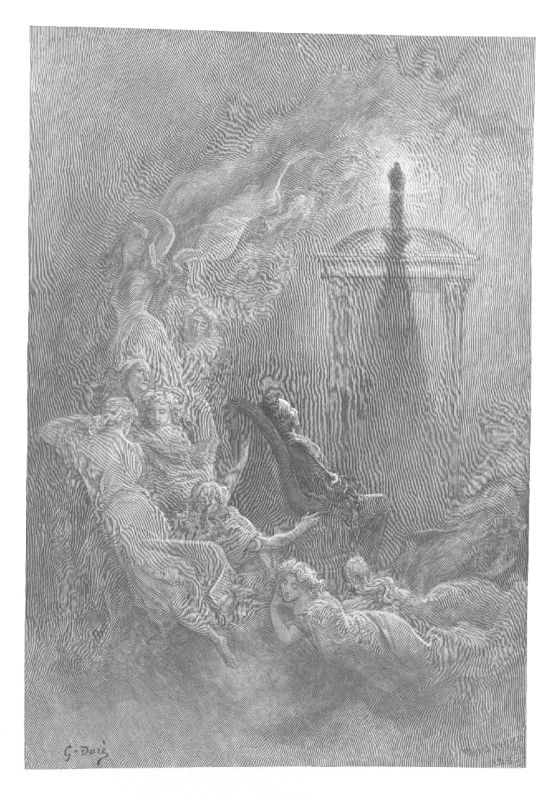
|
"Till I scarcely more than muttered, 'Other friends have flown before— On the morrow he will leave me, as my hopes have flown before.'" |
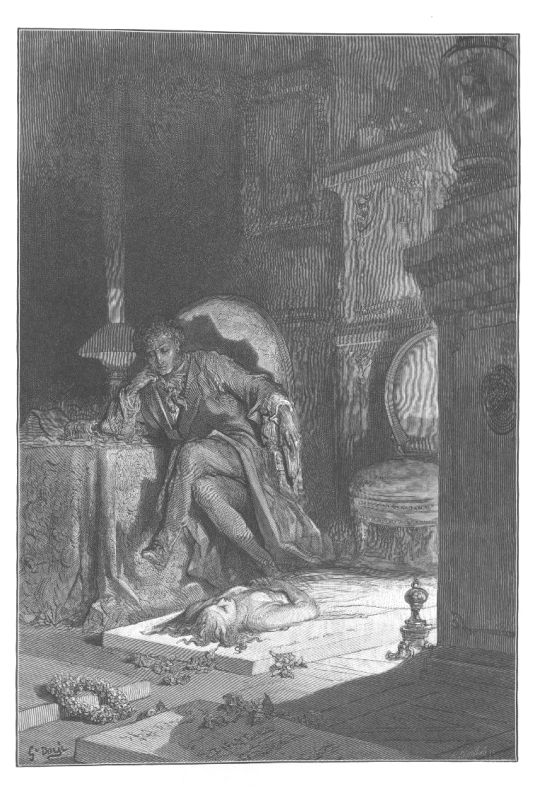
|
"Then, upon the velvet sinking, I betook myself to linking Fancy unto fancy." |
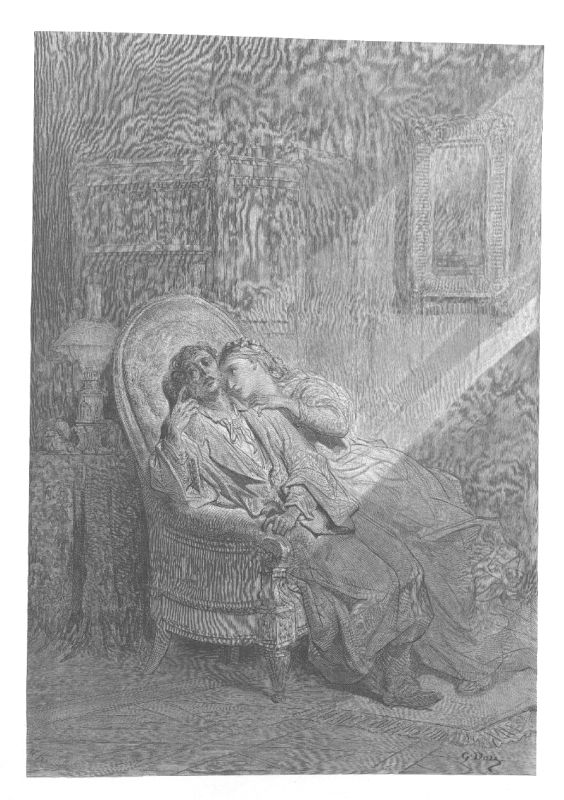
|
"But whose velvet violet lining with the lamplight gloating o'er She shall press, ah, nevermore!" |
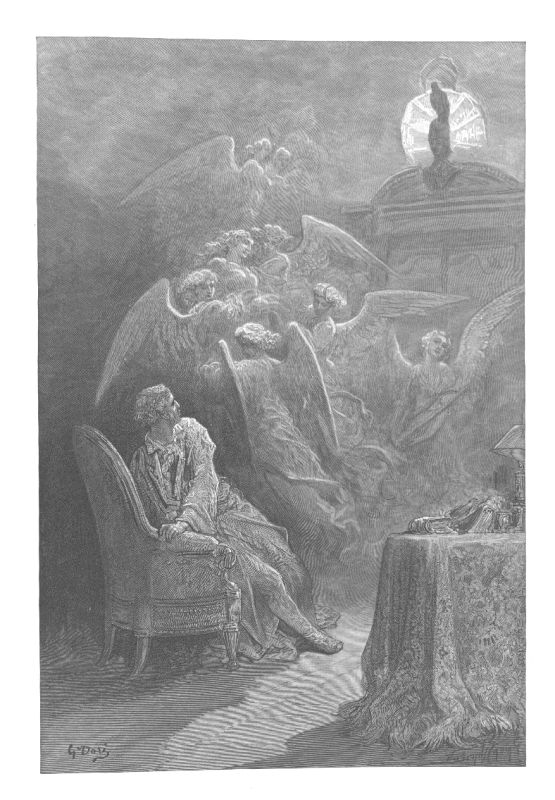
|
"'Wretch,' I cried, 'thy God hath lent thee—by these angels he hath sent thee Respite—respite and nepenthe from thy memories of Lenore!'" |
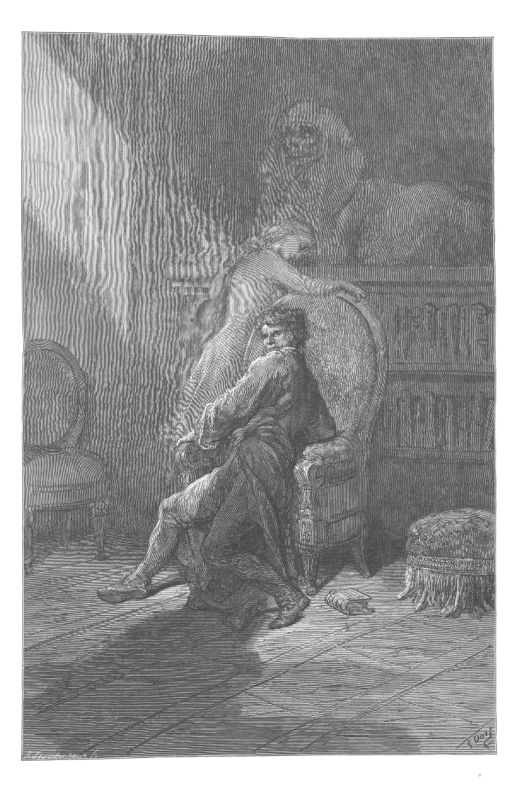
| "On this home by Horror haunted." |
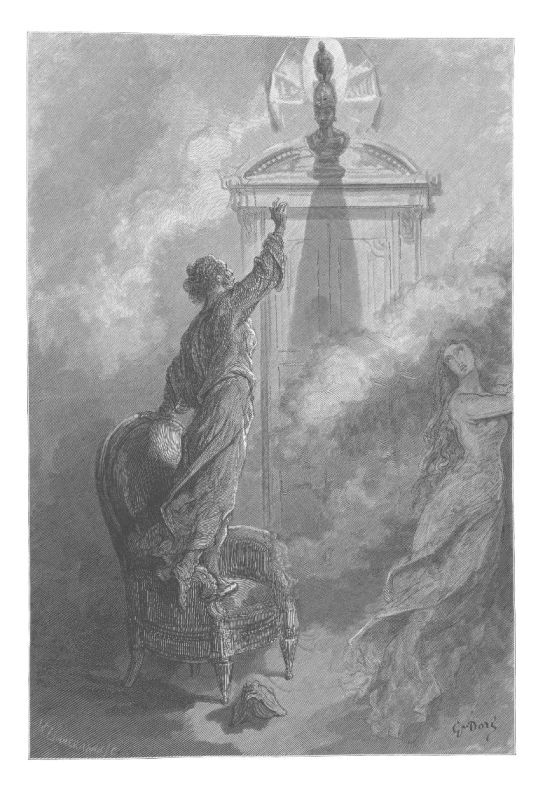
|
. . . . . . . . . "Tell me truly, I implore— Is there—is there balm in Gilead?—tell me—tell me, I implore!" |
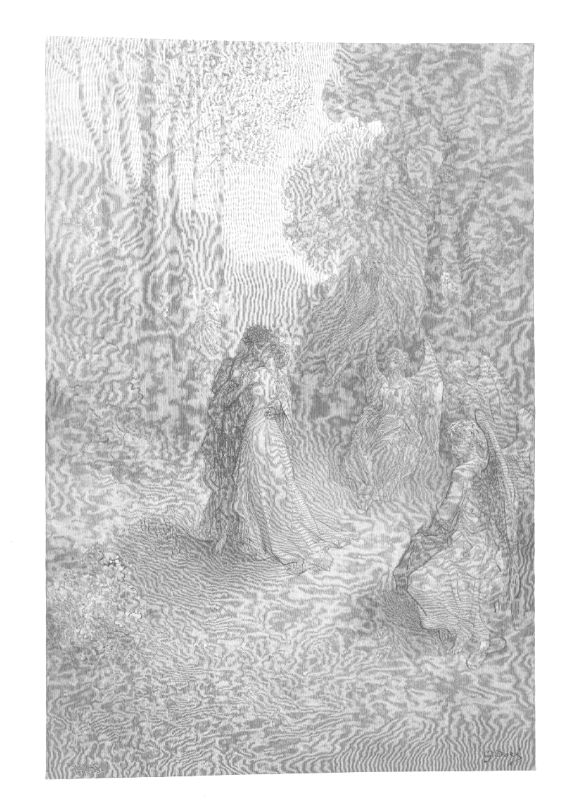
|
"Tell this soul with sorrow laden if, within the distant Aidenn, It shall clasp a sainted maiden whom the angels name Lenore." |
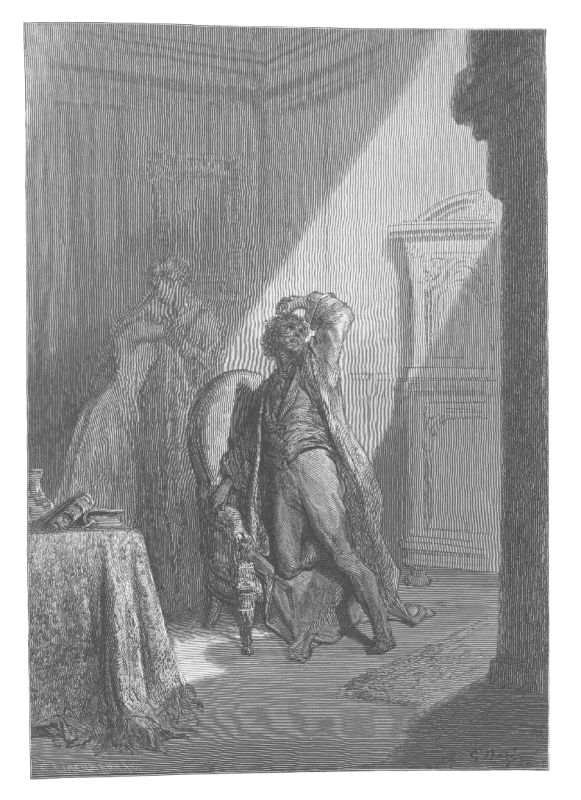
| "'Be that word our sign of parting, bird or fiend!' I shrieked, upstarting." |
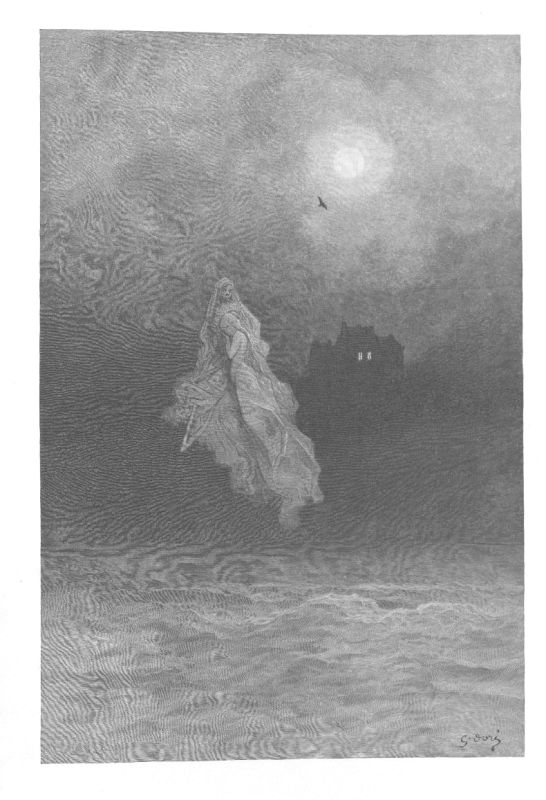
| "'Get thee back into the tempest and the Night's Plutonian shore!'" |
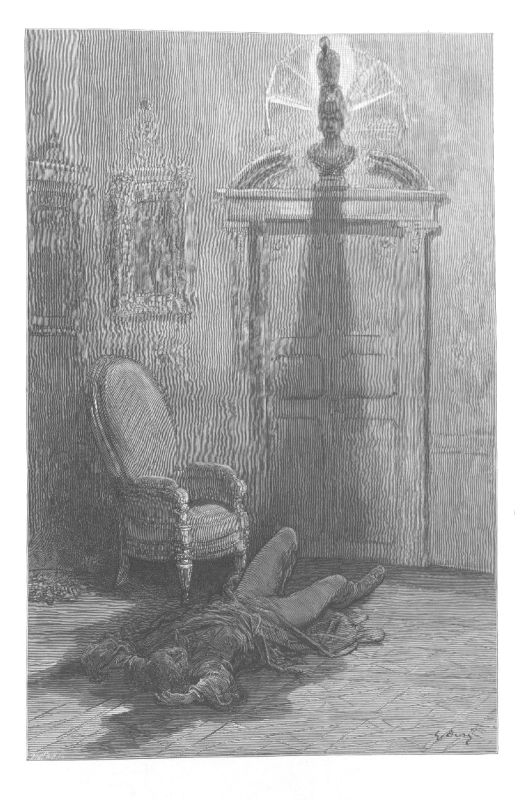
|
"And my soul from out that shadow that lies floating on the floor Shall be lifted—nevermore!" |
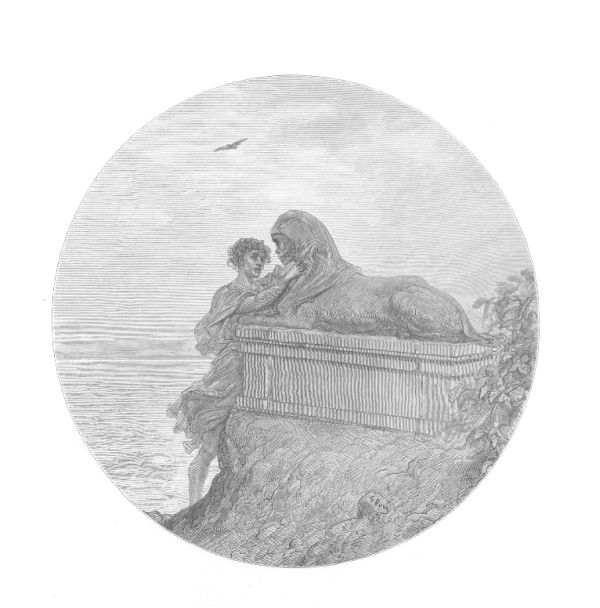
End of the Project Gutenberg EBook of The Raven, by Edgar Allan Poe
*** END OF THIS PROJECT GUTENBERG EBOOK THE RAVEN ***
***** This file should be named 17192-h.htm or 17192-h.zip *****
This and all associated files of various formats will be found in:
https://www.gutenberg.org/1/7/1/9/17192/
Produced by Jason Isbell, Melissa Er-Raqabi and the Online
Distributed Proofreading Team at https://www.pgdp.net.
Updated editions will replace the previous one--the old editions
will be renamed.
Creating the works from public domain print editions means that no
one owns a United States copyright in these works, so the Foundation
(and you!) can copy and distribute it in the United States without
permission and without paying copyright royalties. Special rules,
set forth in the General Terms of Use part of this license, apply to
copying and distributing Project Gutenberg-tm electronic works to
protect the PROJECT GUTENBERG-tm concept and trademark. Project
Gutenberg is a registered trademark, and may not be used if you
charge for the eBooks, unless you receive specific permission. If you
do not charge anything for copies of this eBook, complying with the
rules is very easy. You may use this eBook for nearly any purpose
such as creation of derivative works, reports, performances and
research. They may be modified and printed and given away--you may do
practically ANYTHING with public domain eBooks. Redistribution is
subject to the trademark license, especially commercial
redistribution.
*** START: FULL LICENSE ***
THE FULL PROJECT GUTENBERG LICENSE
PLEASE READ THIS BEFORE YOU DISTRIBUTE OR USE THIS WORK
To protect the Project Gutenberg-tm mission of promoting the free
distribution of electronic works, by using or distributing this work
(or any other work associated in any way with the phrase "Project
Gutenberg"), you agree to comply with all the terms of the Full Project
Gutenberg-tm License (available with this file or online at
https://gutenberg.org/license).
Section 1. General Terms of Use and Redistributing Project Gutenberg-tm
electronic works
1.A. By reading or using any part of this Project Gutenberg-tm
electronic work, you indicate that you have read, understand, agree to
and accept all the terms of this license and intellectual property
(trademark/copyright) agreement. If you do not agree to abide by all
the terms of this agreement, you must cease using and return or destroy
all copies of Project Gutenberg-tm electronic works in your possession.
If you paid a fee for obtaining a copy of or access to a Project
Gutenberg-tm electronic work and you do not agree to be bound by the
terms of this agreement, you may obtain a refund from the person or
entity to whom you paid the fee as set forth in paragraph 1.E.8.
1.B. "Project Gutenberg" is a registered trademark. It may only be
used on or associated in any way with an electronic work by people who
agree to be bound by the terms of this agreement. There are a few
things that you can do with most Project Gutenberg-tm electronic works
even without complying with the full terms of this agreement. See
paragraph 1.C below. There are a lot of things you can do with Project
Gutenberg-tm electronic works if you follow the terms of this agreement
and help preserve free future access to Project Gutenberg-tm electronic
works. See paragraph 1.E below.
1.C. The Project Gutenberg Literary Archive Foundation ("the Foundation"
or PGLAF), owns a compilation copyright in the collection of Project
Gutenberg-tm electronic works. Nearly all the individual works in the
collection are in the public domain in the United States. If an
individual work is in the public domain in the United States and you are
located in the United States, we do not claim a right to prevent you from
copying, distributing, performing, displaying or creating derivative
works based on the work as long as all references to Project Gutenberg
are removed. Of course, we hope that you will support the Project
Gutenberg-tm mission of promoting free access to electronic works by
freely sharing Project Gutenberg-tm works in compliance with the terms of
this agreement for keeping the Project Gutenberg-tm name associated with
the work. You can easily comply with the terms of this agreement by
keeping this work in the same format with its attached full Project
Gutenberg-tm License when you share it without charge with others.
1.D. The copyright laws of the place where you are located also govern
what you can do with this work. Copyright laws in most countries are in
a constant state of change. If you are outside the United States, check
the laws of your country in addition to the terms of this agreement
before downloading, copying, displaying, performing, distributing or
creating derivative works based on this work or any other Project
Gutenberg-tm work. The Foundation makes no representations concerning
the copyright status of any work in any country outside the United
States.
1.E. Unless you have removed all references to Project Gutenberg:
1.E.1. The following sentence, with active links to, or other immediate
access to, the full Project Gutenberg-tm License must appear prominently
whenever any copy of a Project Gutenberg-tm work (any work on which the
phrase "Project Gutenberg" appears, or with which the phrase "Project
Gutenberg" is associated) is accessed, displayed, performed, viewed,
copied or distributed:
This eBook is for the use of anyone anywhere at no cost and with
almost no restrictions whatsoever. You may copy it, give it away or
re-use it under the terms of the Project Gutenberg License included
with this eBook or online at www.gutenberg.org
1.E.2. If an individual Project Gutenberg-tm electronic work is derived
from the public domain (does not contain a notice indicating that it is
posted with permission of the copyright holder), the work can be copied
and distributed to anyone in the United States without paying any fees
or charges. If you are redistributing or providing access to a work
with the phrase "Project Gutenberg" associated with or appearing on the
work, you must comply either with the requirements of paragraphs 1.E.1
through 1.E.7 or obtain permission for the use of the work and the
Project Gutenberg-tm trademark as set forth in paragraphs 1.E.8 or
1.E.9.
1.E.3. If an individual Project Gutenberg-tm electronic work is posted
with the permission of the copyright holder, your use and distribution
must comply with both paragraphs 1.E.1 through 1.E.7 and any additional
terms imposed by the copyright holder. Additional terms will be linked
to the Project Gutenberg-tm License for all works posted with the
permission of the copyright holder found at the beginning of this work.
1.E.4. Do not unlink or detach or remove the full Project Gutenberg-tm
License terms from this work, or any files containing a part of this
work or any other work associated with Project Gutenberg-tm.
1.E.5. Do not copy, display, perform, distribute or redistribute this
electronic work, or any part of this electronic work, without
prominently displaying the sentence set forth in paragraph 1.E.1 with
active links or immediate access to the full terms of the Project
Gutenberg-tm License.
1.E.6. You may convert to and distribute this work in any binary,
compressed, marked up, nonproprietary or proprietary form, including any
word processing or hypertext form. However, if you provide access to or
distribute copies of a Project Gutenberg-tm work in a format other than
"Plain Vanilla ASCII" or other format used in the official version
posted on the official Project Gutenberg-tm web site (www.gutenberg.org),
you must, at no additional cost, fee or expense to the user, provide a
copy, a means of exporting a copy, or a means of obtaining a copy upon
request, of the work in its original "Plain Vanilla ASCII" or other
form. Any alternate format must include the full Project Gutenberg-tm
License as specified in paragraph 1.E.1.
1.E.7. Do not charge a fee for access to, viewing, displaying,
performing, copying or distributing any Project Gutenberg-tm works
unless you comply with paragraph 1.E.8 or 1.E.9.
1.E.8. You may charge a reasonable fee for copies of or providing
access to or distributing Project Gutenberg-tm electronic works provided
that
- You pay a royalty fee of 20% of the gross profits you derive from
the use of Project Gutenberg-tm works calculated using the method
you already use to calculate your applicable taxes. The fee is
owed to the owner of the Project Gutenberg-tm trademark, but he
has agreed to donate royalties under this paragraph to the
Project Gutenberg Literary Archive Foundation. Royalty payments
must be paid within 60 days following each date on which you
prepare (or are legally required to prepare) your periodic tax
returns. Royalty payments should be clearly marked as such and
sent to the Project Gutenberg Literary Archive Foundation at the
address specified in Section 4, "Information about donations to
the Project Gutenberg Literary Archive Foundation."
- You provide a full refund of any money paid by a user who notifies
you in writing (or by e-mail) within 30 days of receipt that s/he
does not agree to the terms of the full Project Gutenberg-tm
License. You must require such a user to return or
destroy all copies of the works possessed in a physical medium
and discontinue all use of and all access to other copies of
Project Gutenberg-tm works.
- You provide, in accordance with paragraph 1.F.3, a full refund of any
money paid for a work or a replacement copy, if a defect in the
electronic work is discovered and reported to you within 90 days
of receipt of the work.
- You comply with all other terms of this agreement for free
distribution of Project Gutenberg-tm works.
1.E.9. If you wish to charge a fee or distribute a Project Gutenberg-tm
electronic work or group of works on different terms than are set
forth in this agreement, you must obtain permission in writing from
both the Project Gutenberg Literary Archive Foundation and Michael
Hart, the owner of the Project Gutenberg-tm trademark. Contact the
Foundation as set forth in Section 3 below.
1.F.
1.F.1. Project Gutenberg volunteers and employees expend considerable
effort to identify, do copyright research on, transcribe and proofread
public domain works in creating the Project Gutenberg-tm
collection. Despite these efforts, Project Gutenberg-tm electronic
works, and the medium on which they may be stored, may contain
"Defects," such as, but not limited to, incomplete, inaccurate or
corrupt data, transcription errors, a copyright or other intellectual
property infringement, a defective or damaged disk or other medium, a
computer virus, or computer codes that damage or cannot be read by
your equipment.
1.F.2. LIMITED WARRANTY, DISCLAIMER OF DAMAGES - Except for the "Right
of Replacement or Refund" described in paragraph 1.F.3, the Project
Gutenberg Literary Archive Foundation, the owner of the Project
Gutenberg-tm trademark, and any other party distributing a Project
Gutenberg-tm electronic work under this agreement, disclaim all
liability to you for damages, costs and expenses, including legal
fees. YOU AGREE THAT YOU HAVE NO REMEDIES FOR NEGLIGENCE, STRICT
LIABILITY, BREACH OF WARRANTY OR BREACH OF CONTRACT EXCEPT THOSE
PROVIDED IN PARAGRAPH F3. YOU AGREE THAT THE FOUNDATION, THE
TRADEMARK OWNER, AND ANY DISTRIBUTOR UNDER THIS AGREEMENT WILL NOT BE
LIABLE TO YOU FOR ACTUAL, DIRECT, INDIRECT, CONSEQUENTIAL, PUNITIVE OR
INCIDENTAL DAMAGES EVEN IF YOU GIVE NOTICE OF THE POSSIBILITY OF SUCH
DAMAGE.
1.F.3. LIMITED RIGHT OF REPLACEMENT OR REFUND - If you discover a
defect in this electronic work within 90 days of receiving it, you can
receive a refund of the money (if any) you paid for it by sending a
written explanation to the person you received the work from. If you
received the work on a physical medium, you must return the medium with
your written explanation. The person or entity that provided you with
the defective work may elect to provide a replacement copy in lieu of a
refund. If you received the work electronically, the person or entity
providing it to you may choose to give you a second opportunity to
receive the work electronically in lieu of a refund. If the second copy
is also defective, you may demand a refund in writing without further
opportunities to fix the problem.
1.F.4. Except for the limited right of replacement or refund set forth
in paragraph 1.F.3, this work is provided to you 'AS-IS', WITH NO OTHER
WARRANTIES OF ANY KIND, EXPRESS OR IMPLIED, INCLUDING BUT NOT LIMITED TO
WARRANTIES OF MERCHANTIBILITY OR FITNESS FOR ANY PURPOSE.
1.F.5. Some states do not allow disclaimers of certain implied
warranties or the exclusion or limitation of certain types of damages.
If any disclaimer or limitation set forth in this agreement violates the
law of the state applicable to this agreement, the agreement shall be
interpreted to make the maximum disclaimer or limitation permitted by
the applicable state law. The invalidity or unenforceability of any
provision of this agreement shall not void the remaining provisions.
1.F.6. INDEMNITY - You agree to indemnify and hold the Foundation, the
trademark owner, any agent or employee of the Foundation, anyone
providing copies of Project Gutenberg-tm electronic works in accordance
with this agreement, and any volunteers associated with the production,
promotion and distribution of Project Gutenberg-tm electronic works,
harmless from all liability, costs and expenses, including legal fees,
that arise directly or indirectly from any of the following which you do
or cause to occur: (a) distribution of this or any Project Gutenberg-tm
work, (b) alteration, modification, or additions or deletions to any
Project Gutenberg-tm work, and (c) any Defect you cause.
Section 2. Information about the Mission of Project Gutenberg-tm
Project Gutenberg-tm is synonymous with the free distribution of
electronic works in formats readable by the widest variety of computers
including obsolete, old, middle-aged and new computers. It exists
because of the efforts of hundreds of volunteers and donations from
people in all walks of life.
Volunteers and financial support to provide volunteers with the
assistance they need, is critical to reaching Project Gutenberg-tm's
goals and ensuring that the Project Gutenberg-tm collection will
remain freely available for generations to come. In 2001, the Project
Gutenberg Literary Archive Foundation was created to provide a secure
and permanent future for Project Gutenberg-tm and future generations.
To learn more about the Project Gutenberg Literary Archive Foundation
and how your efforts and donations can help, see Sections 3 and 4
and the Foundation web page at https://www.pglaf.org.
Section 3. Information about the Project Gutenberg Literary Archive
Foundation
The Project Gutenberg Literary Archive Foundation is a non profit
501(c)(3) educational corporation organized under the laws of the
state of Mississippi and granted tax exempt status by the Internal
Revenue Service. The Foundation's EIN or federal tax identification
number is 64-6221541. Its 501(c)(3) letter is posted at
https://pglaf.org/fundraising. Contributions to the Project Gutenberg
Literary Archive Foundation are tax deductible to the full extent
permitted by U.S. federal laws and your state's laws.
The Foundation's principal office is located at 4557 Melan Dr. S.
Fairbanks, AK, 99712., but its volunteers and employees are scattered
throughout numerous locations. Its business office is located at
809 North 1500 West, Salt Lake City, UT 84116, (801) 596-1887, email
business@pglaf.org. Email contact links and up to date contact
information can be found at the Foundation's web site and official
page at https://pglaf.org
For additional contact information:
Dr. Gregory B. Newby
Chief Executive and Director
gbnewby@pglaf.org
Section 4. Information about Donations to the Project Gutenberg
Literary Archive Foundation
Project Gutenberg-tm depends upon and cannot survive without wide
spread public support and donations to carry out its mission of
increasing the number of public domain and licensed works that can be
freely distributed in machine readable form accessible by the widest
array of equipment including outdated equipment. Many small donations
($1 to $5,000) are particularly important to maintaining tax exempt
status with the IRS.
The Foundation is committed to complying with the laws regulating
charities and charitable donations in all 50 states of the United
States. Compliance requirements are not uniform and it takes a
considerable effort, much paperwork and many fees to meet and keep up
with these requirements. We do not solicit donations in locations
where we have not received written confirmation of compliance. To
SEND DONATIONS or determine the status of compliance for any
particular state visit https://pglaf.org
While we cannot and do not solicit contributions from states where we
have not met the solicitation requirements, we know of no prohibition
against accepting unsolicited donations from donors in such states who
approach us with offers to donate.
International donations are gratefully accepted, but we cannot make
any statements concerning tax treatment of donations received from
outside the United States. U.S. laws alone swamp our small staff.
Please check the Project Gutenberg Web pages for current donation
methods and addresses. Donations are accepted in a number of other
ways including including checks, online payments and credit card
donations. To donate, please visit: https://pglaf.org/donate
Section 5. General Information About Project Gutenberg-tm electronic
works.
Professor Michael S. Hart was the originator of the Project Gutenberg-tm
concept of a library of electronic works that could be freely shared
with anyone. For thirty years, he produced and distributed Project
Gutenberg-tm eBooks with only a loose network of volunteer support.
Project Gutenberg-tm eBooks are often created from several printed
editions, all of which are confirmed as Public Domain in the U.S.
unless a copyright notice is included. Thus, we do not necessarily
keep eBooks in compliance with any particular paper edition.
Most people start at our Web site which has the main PG search facility:
https://www.gutenberg.org
This Web site includes information about Project Gutenberg-tm,
including how to make donations to the Project Gutenberg Literary
Archive Foundation, how to help produce our new eBooks, and how to
subscribe to our email newsletter to hear about new eBooks.
*** END: FULL LICENSE ***